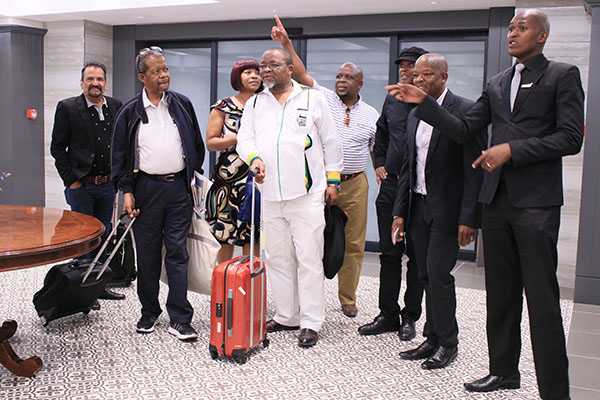South Africa sneezes …. Botswana likely to catch a cold
Downgrade to affect fuel, food prices
SACU revenues likely to drop
Botswana, the diamond-rich economy struggling to recover from the global commodity crunch, faces yet another painful test with this week’s downgrade of South Africa’s credit rating by Standard & Poor’s.
This is the common view coming out clearly from various economic commentators. They say there is no way Botswana can escape the pinch of a political meltdown in its neighbour following the widely-criticised cabinet reshuffle by President Jacob Zuma last Thursday.
South Africa is currently a country grappling with economic and political tensions. This week the credit agency, S&P cut the country credit status to junk, arguing that the political upheavals in Africa’s most advanced-economy have endangered the economy which has not grown above 1 percent in recent years.
The downgrade will surely hit home and this will be a Catch 22 situation for Botswana which is failing to contain runaway unemployment rates, currently standing at 16, 4 percent. “It will not serve Botswana’s economy well if South Africa’s economy was to go down as a result of the downgrade,” said Standard Chartered plc Chief Economist(Africa), Razia Khan.
She was speaking to Botswana Guardian Wednesday afternoon at a focus group meeting of local business owners organised jointly by Standard Chartered Bank Botswana and Botswana Investment and Trade Centre (BITC).
Botswana, a landlocked-country imports most of its goods and services through South Africa, whose President Jacob Zuma sacked both his finance minister, Pravin Gordhan and deputy, Mcebisi Jonas in a widely-slammed cabinet reshuffle which has weakened the Rand. The Pula is pegged to the Rand in a basket of currencies known as Special Drawing Rights (SDR).
Botswanan-born Khan, who is based in London and Garry Juma, Head of Research at Motswedi Securities, concur that the medium to long term results of the downgrade and political tension in South Africa, will also have adverse impact on the Southern African Customs Union (SACU), which Botswana has come to depend on, especially at a time when revenue from diamonds is now hard to come by.
“We will feel the pinch,” Juma told Botswana Guardian. He has all the reasons to believe so. South Africa is the biggest revenue contributor to SACU, which in turn is a reliable cash-cow for Botswana after diamonds and statutory taxes.
According to Botswana Unified Revenue Services annual report for 2015, SACU revenue increased by 13, 7 percent to R89, 2billion, powered by South Africa. The once apartheid-governed country contributed more than 40percent to this total figure, which clearly shows that the fall in the country’s economy and trading activities will adversely affect the Union, which also counts Swaziland, Lesotho and Namibia as its members.
Local analysts are also jittery that the downgrade, which can also invite other rating agencies to follow suit, will also affect South Africa’s ability to trade on the backdrop of reduced consumer confidence, which ultimately will have ripple effects in Botswana and the entire SADC region.
The business community in Botswana is also wary of current developments in the region’s economic powerhouse. President of Botswana Exporters and Manufacturers Association (BEMA), Nkosi Mwaba said on Wednesday: “These are unfortunate events. We do a lot of trading with South Africa and if the Rand continues to fall, we will be negatively affected’.
The Rand fell by as much as 2percent after South Africa’s cabinet reshuffle last week to trade at nearly R14 to the US dollar. Botswana, a diamond rich economy imported goods and servicesworth $4,4billion (about P44billion) from South Africa in 2015. This data was obtained from Global Edge this week.
Although it is still early days, the current economic situation prevailing in South Africa will also hurt the domestic economy which is facing an expanded budget deficit for the current financial year.
The downgrade of South Africa’s economy means the cost of accessing capital will go up for government and major companies operating in that country, said Juma. “This will also mean interest rates will go up and this also translates to higher inflation,” said Juma, who is a former economist at the Reserve Bank of Zimbabwe. The high interest and inflation rates will basically mean Botswana will be forced to pay more for its goods and services in South Africa, added Juma.
All this impact will be felt in the medium to long term.
Prices of fuel will likely go up in South Africa as well as Botswana since Botswana gets most of its petroleum products in South Africa. He made the estimates on the basis that most oil products are priced in US dollar and major currencies which the Rand is pegged to. Juma said the current economic uncertainty in South Africa is a wake-up call for Botswana to stop reliance in South Africa. On an unrelated matter, African National Congress Secretary General Secretary, Gwede Mantashe jetted into the country on Wednesday to meet Botswana Democratic Party (BDP) top brass to discuss matters of common interest between the two parties.
There is likelihood that, the BDP will have had one or two words with Mantashe over the current political and economic uncertainties in South Africa, where the president is under pressure from opposition and his own party to step down. April 18 has been set aside for Parliament to debate a Motion of No Confidence on JZ.






